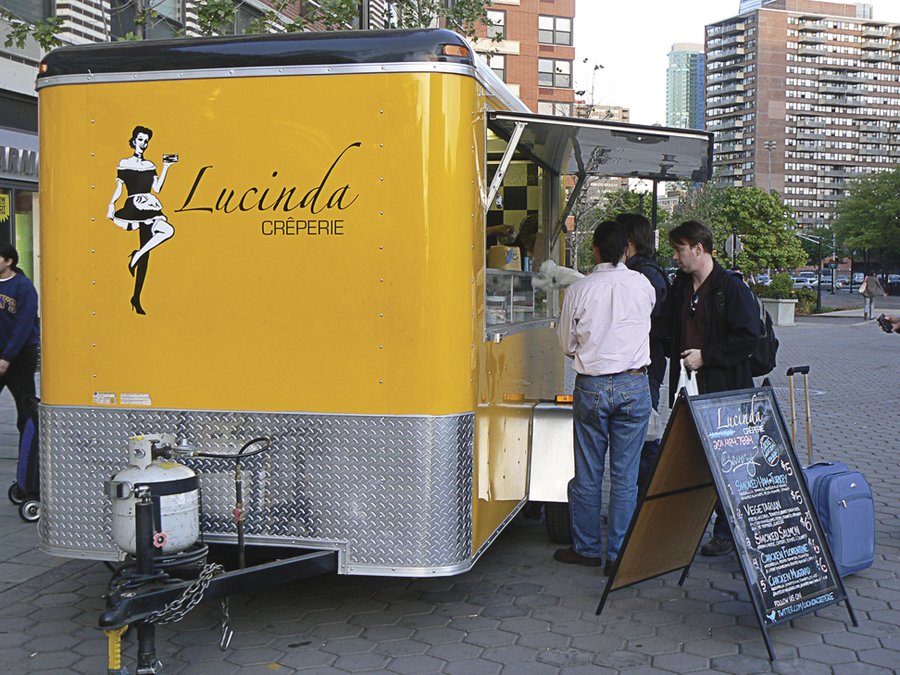The city is poised to crack down on those popular food truck vendors that have sprouted up around Grove Street, Journal Square, and Newport over the last couple of years.
On Tuesday, the Jersey City Council introduced an amendment to an existing food establishment law, adding stricter rules for mobile food vendors. The new rules would keep food trucks at least 200 feet from restaurants and other food vendors, raise fees, would hours of operation, would require background checks, and add other restrictions.
Some vendors say the proposed changes are unfair and subject them to a level of scrutiny not given to restaurant owners. But according to Ward E City Councilman Steven Fulop, who represents one of the communities in which food trucks have increased most in recent years, changes are needed to protect the public.
Jersey City isn’t the only local municipality to crack down on food trucks.
____________
Leveling the playing field
Many food cart vendors say that operating a truck is an affordable way for would-be restaurateurs to enter the food service industry, since operating costs are much lower than those associated with opening a restaurant.
“Eventually, I plan to have a restaurant,” said Jersey City food cart owner Alex Fernandez, a longtime cook who wants to attend culinary school one day. “This operation is like a mini restaurant and will teach me things I’ll need to know later on.”
Many customers also like the convenience and low-cost food offered by these vendors.
Their presence, however, is not welcomed by everyone.
Restaurant owners complain that food truck vendors cut into their customer base but don’t have to pay many of the overhead costs associated with owning a restaurant. And when food trucks park on city streets for hours at a time, they take up parking.
In recent years, several municipalities have sought to level the playing field by tightening some of the regulations about food trucks.
The proposed amendment in Jersey City, if passed, will require all food cart operators to acquire a license from the city, which must be renewed each year. The license fee would be $300 in 2012 and would increase by $100 each year until the annual fee hits $500 in 2014. Vendors would also be required to pay a $50 medallion fee.
Applicants for the food cart license would also have to submit to a criminal background check, which may include fingerprinting. The purpose of the background check, which will cost the applicant another $75, is to alert the city of any recent felony convictions an applicant may have.
Food trucks will be banned from using city streets to operate their businesses. They’ll be able to sit on some sidewalks and in plazas (for instance, Grove Plaza and the area the Exchange PATH station). They must operate at least 200 feet from restaurants and other food trucks. The amendment also sets allowable hours of operation and eight zones within the city where low-end food truck vendors cannot operate. (In these eight zones, higher end gourmet food trucks may eventually be permitted to operate, but will have to pay higher license fees to do so.)
‘Hundreds operating illegally’
“There were hundreds of vendors that were operating illegally,” Fulop said after the council meeting, adding that there are about 300 food truck operators in the city. “We needed a process that would curtail that to a manageable number.”
Despite the intent of the amendment, some food cart operators and food truck vendors argue that they are being singled out and treated differently than restaurant owners.
Francesca Saldana, who operates a pushcart stand near Journal Square with her husband, specifically took issue with the criminal background check.
“No other food retail business license in Jersey City is required to submit to this prior to approval or issuance of a license,” Saldana told the council Tuesday. “Not the pizza guy. Not the deli guy. Not the ice cream parlor and not even the restaurant/bar guy…If they are going to investigate, then why do we need to recall every possible ‘grounds for rejection’ and put it in writing?”
Saldana and her husband, James Saldana, who also addressed the council, asked that the City Council table the amendment.
“We’re not looking for outstanding parking tickets,” Fulop countered later. “We’re looking for felonies, substantial things. The city wants to know about those sorts of things before someone’s allowed to deal with the public.”
In fact, bars and restaurants that sell beer, wine, and other alcohol must obtain a liquor license to do so. Liquor license applications in most states, including New Jersey, include a criminal background check.
A web search of ordinances passed in recent years revealed that many cities and counties across the country also now require mobile ice cream vendors to be licensed and subjected to criminal background checks. Such laws have been enacted in response to cases in which drug dealers or pedophiles used their ice cream business to gain access to children.
Proposal in line with other Hudson County cities
Jersey City isn’t the only local municipality to crack down on food trucks.
In neighboring Hoboken, the City Council is weighing an ordinance that would require food truck vendors to pay more than $4,250 in parking permits, application fees, and licenses. At present, food truck vendors pay $500 in city permits and feed parking meters to park on the streets. They would also be required to park at least 100 feet from a restaurant.
The Hoboken City Council may revise this proposal before a final vote.
Secaucus bans food trucks from operating on municipal land, limiting them to private property only. The trucks tend to operate in the parking lots of companies located on the outskirts of town that have agreed to let them vend to their employees.
If the Jersey City Council does not table the proposed amendment, changes in the city’s food vending law could be approved early next year.
E-mail E. Assata Wright at awright@hudsonreporter.com.
